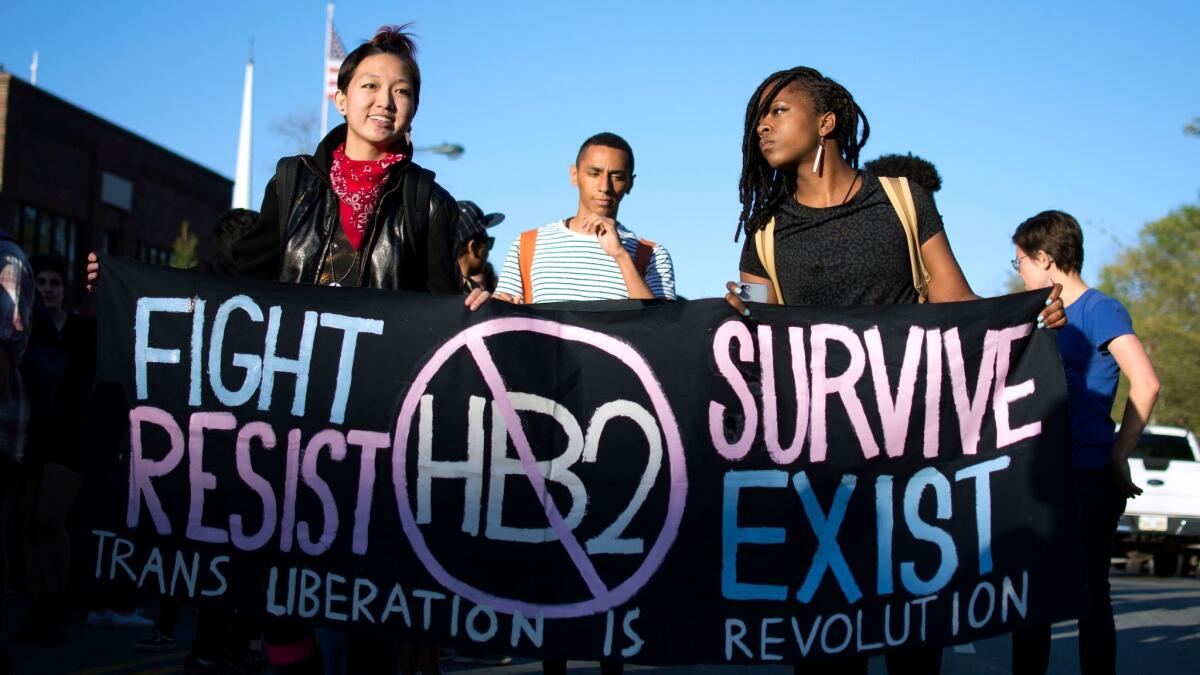Editorial: California’s latest boycott is well-meaning but ill-conceived and ineffective

Boycotts are having a moment. There is a boycott by liberals against retailers who carry the Ivanka Trump clothing line, for example, and another by conservatives against Kellogg’s for removing its advertising from an alt-right website. Macy’s has been hit from both ends: President-elect Donald Trump called for a boycott against the chain when it dropped his line of merchandise in 2015, and now many of his opponents are boycotting because it didn’t drop his daughter’s goods as well.
Not to be outdone, California jumped into the boycott fray with a law that took effect Jan. 1. The measure, AB 1887, prohibits state funds from being used for travel to states that are believed to discriminate against gay and transgender people through recently passed laws of their own. That includes states that have adopted rules that prevent transgender people from using the bathroom of the gender with which they identify.
There are certain exceptions, including for essential travel to fulfill a contractual obligation and for a state employee to keep up with requirements for his or her professional license. But the law could stop professors at the state’s public colleges and universities from traveling to academic or professional conferences, and could keep college or school sports teams from traveling to games, among other things.
It doesn’t make sense to punish entire states, including their universities, schools and citizens, over this one issue, important as it is.
According to the California Attorney General’s Office, the states on the no-travel list are Kansas, Mississippi, North Carolina and Tennessee. Perhaps California has little interaction with those states to begin with, which would mean minimal impact on state employees — although it also means a boycott would have little or no effect on the states involved. Just last week, however, the governor of Texas, the nation’s second most-populous state, announced legislation that not only would require people to use the public bathrooms that align with their “biological sex,” but also would wipe out anti-discrimination laws that were adopted by several Texas cities. Several other states are considering bathroom laws to restrict transgender rights. Is California planning to go to war with states across the nation?
Such mandates on transgender people are repulsive, of course. California legislators are right to denounce them. But this boycott was a bad idea. It’s unlikely to have any effect on gay rights while creating unnecessary strife and placing problematic restrictions on state employees who might have legitimate reasons to travel.
The state’s professors should be able to engage in the free exchange of ideas; that’s key to academia. Other professionals who happen to be state employees — doctors, lawyers, public health experts, engineers — should be able to attend worthwhile professional conferences or meet with helpful counterparts in other states, even if those meetings aren’t strictly essential. It doesn’t make sense to punish entire states, including their universities, schools and citizens, over this one issue, important as it is.
Nor are legislators applying their principles consistently. If California is going to boycott these states, then perhaps it also should forbid state money from being used to buy anything made in China, where same-sex marriage is illegal and same-sex couples cannot jointly adopt children. Good luck with that one. Or for that matter, perhaps the many nations and states that had legalized same-sex marriage by 2008 should have boycotted California when voters here passed the Proposition 8 ban on same-sex marriage.
If the recent presidential election proved one thing, it’s that the divisions among states are growing sharper, whether the topic is abortion rights, immigration or environmental protection. Using those disagreements to call for sanctions against each other is ultimately more destructive than helpful. And by kicking off interstate boycotts, California is inviting retribution. Deeply conservative states might call for severing interaction because California provides health insurance to children living in the state illegally, publicly funds abortion and allows transgender people to pick their bathrooms. After all, it must feel a little dangerous to them to send state employees to California, where they would discover that nothing bad happens as a result of respecting others’ sexual identities.
Boycotts have a long and venerable history of success: Californians can look back with pride on the table-grape boycott of the 1960s that led to better working conditions for farmhands. Like that campaign, the best boycotts do more than rattle sabers. They are well-targeted and have a meaningful effect. They don’t carry a list of exemptions and exceptions, and they stand a good chance of bringing about change with a low risk of retaliation and unintended consequences. California’s well-intended boycott on behalf of LGBTQ rights meets none of these standards.
Follow the Opinion section on Twitter @latimesopinion and Facebook
More to Read
A cure for the common opinion
Get thought-provoking perspectives with our weekly newsletter.
You may occasionally receive promotional content from the Los Angeles Times.






